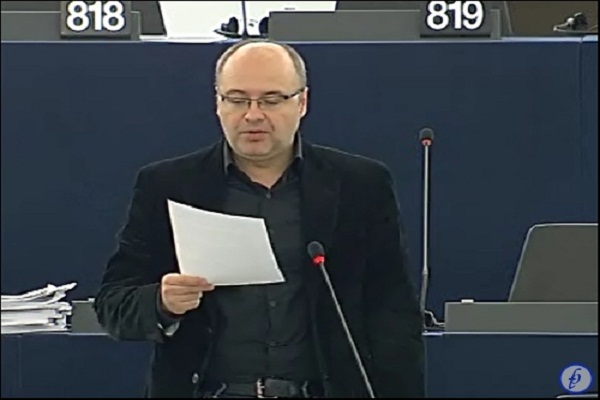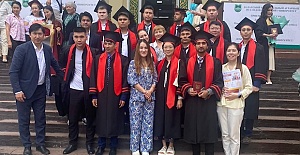EU Parliament hold its plenary session on Thursday 14th March 2013 and passes the resolution condemning the attacks on Iraqi Turkmens calling both Iraqi and Kurdish authorities to hold investigation to these terrorist attacks and to bring those responsible to justice.
MEPs expressed their concerned at the increasing acts of violence suffered by the civilian population and specially the Turkmens has been the most vulnerable group to these terror attacks in Iraq and calls on the Iraqi authorities to improve security. MEP Mr. Metin Kazak on his speech pointed out despite the Iraqi High Commotion for human rights admitted the increase violence towards Iraqi Turkmens , yet neither Iraqi or Kurdish government has done much to protect them calling EU to work closely with Iraqi Government to put an end to Iraqi Turkmens suffering;
European Parliament resolution on Iraq: the plight of minority groups, including the Iraqi Turkmen
(2013/2562(RSP))
The European Parliament,
– having regard to its previous resolutions on Iraq, notably its resolutions of 6 April 2006 on the Assyrian community and of 25 November 2010 on attacks against Christian communities ,
– having regard to the Partnership and Cooperation Agreement between the European Union and its Member States, of the one part, and the Republic of Iraq, of the other part, and to its resolution of 17 January 2013 on the EU-Iraq Partnership and Cooperation Agreement ,
– having regard to the Commission’s Joint Strategy Paper for Iraq (2011-2013),
– having regard to the statement by Vice-President of the Commission / EU High Representative (VP/HR) Catherine Ashton of 25 January 2013 on the recent spate of terrorist attacks in Iraq,
– having regard to the declaration of VP/HR Catherine Ashton of 24 January on the killings at the funeral in Tuz Khurmatu,
– having regard to the International Compact with Iraq, launched by UN Secretary-General Ban Ki-moon and Iraqi Prime Minister Nouri al-Maliki in 2007, which pledges to ‘protect poor and vulnerable groups from deprivation and starvation’,
– having regard to the ‘Human Rights Report on Human Rights in Iraq: January to June 2012’, presented jointly by the United Nations Assistance Mission in Iraq (UNAMI) and the Commission on 19 December 2012,
– having regard to the accompanying press statement by the UN High Commissioner for Human Rights (OHCHR) Navi Pillay that ‘the number of executions so far in 2012, and the manner in which they have been carried out in large batches, is extremely dangerous, cannot be justified, and risks seriously undermining the partial and tentative progress on rule of law in Iraq’,
– having regard to the statement by UN Secretary-General Ban Ki-Moon of 25 January 2013 strongly condemning ‘the recent wave of terrorist attacks across Iraq, which have killed hundreds of people and have left many more wounded’,
– having regard to the 1981 UN Declaration on the Elimination of All Forms of Intolerance and of Discrimination based on Religion or Belief,
– having regard to the International Covenant on Civil and Political Rights of 1966, to which Iraq is a party,
– having regard to Rules 122(5) and 110(4) of its Rules of Procedure,
A. whereas Iraq continues to face serious political, security and socio-economic challenges, and whereas the political scene in the country is extremely fragmented and plagued by violence, to the severe detriment of the legitimate aspirations of the Iraqi people for peace, prosperity and a genuine transition to democracy;
B. whereas the Iraqi Constitution guarantees equality before the law for all its citizens and notably, in Article 125, the ‘administrative, political, cultural and educational rights of the various nationalities, such as Turkmen, Chaldeans, Assyrians and all other nationalities’, and whereas Article 31 of the Constitution of the Kurdistan Region, in force since 2009, guarantees ‘national, cultural and administrative autonomy to the Turkmen, Arabs and Chaldo-Assyrian-Syriacs, Armenian and others who are citizens of Kurdistan whenever they represent the majority of the population’;
C. whereas on 9 April 2012 the Iraqi parliament approved the High Commission for Human Rights, which, while not yet fully functional, is the first independent human rights commission in the country’s history;
D. whereas in the political dialogue with its Iraqi counterparts, Parliament focuses on the human rights situation in Iraq, which continues to be of serious concern given the unsatisfactory situation for vulnerable groups, including minorities;
E. whereas the EU-Iraq agreement, and in particular its human rights clause, emphasises that the EU-Iraqi political dialogue should focus on human rights and strengthening democratic institutions;
F. whereas Iraq has long been home to a variety of ethnic and religious minority groups, including Turkmen, Christians, Kurds, Shabak, Mandaeans, Armenians, Yezidi, Baha’is, Black Iraqis, Assyrians, Jews, Palestinians and others;
G. whereas minorities in Iraq have been the target of assimilation measures and are underrepresented in the Iraqi Government and associated bodies; whereas, as a consequence, the respective populations of minority groups in Iraq have diminished drastically in recent years, as many have fled the country, while others have been forced to relocate elsewhere in Iraq;
H. whereas Turkmen are allegedly the third-largest ethnic group in Iraq; whereas there has been an ongoing dispute between the Turkmen and Kurds over Kirkuk, a region rich in oil and other natural resources, with Turkmen subject to attacks and abductions by both Kurdish forces and Arab extremist groups; whereas both Sunni and Shia Turkmen have been targeted on sectarian grounds;
I. whereas the ongoing dispute between the central government of Iraq and the regional government of Kurdistan has recently escalated, which negatively affects the security situation in the region and endangers the peaceful co-existence of various ethnic groups, notably Kurds, Arabs and Turkmen;
J. whereas, in addition to territorial tensions, northern Iraq is also a target for seemingly sectarian attacks in which the Shi’ite population is frequently targeted by Sunni groups; whereas on 31 December, 39 pilgrims were killed during the Shia festival of Arba’een; whereas on 23 January 2013, an attack on a Shia mosque in Tuz Khurmatu – a town in the Nineveh Province in northern Iraq, which is disputed territory between the government of Iraq and the regional government of Kurdistan and which has a significant Turkmen population – left at least 42 dead and 117 injured;
K. whereas, despite a significant improvement in the security situation, the level of violence faced by the Iraqi population remains unacceptably high, with bombings and shootings reported daily; and whereas continuing tension and violence leave most Iraqis uncertain about their future and make it impossible to promote the economic and social integration of the Iraqi population at large;
1. Is deeply concerned at the increasing acts of violence suffered by the civilian population in Iraq, notably between Sunnis and Shi’ites but also in attacks against particularly vulnerable groups, such as religious, ethnic and cultural minorities, and calls on the Iraqi authorities to improve security and public order and to combat terrorism and sectarian violence throughout the country;
2. Condemns the attacks of 23 January 2013 against the Turkmen funeral in Tuz Khurmatu of a civil servant assassinated the previous day, leaving at least 42 people dead and a further 117 injured, of 3 February 2013 in which a suicide bombing outside a police station in Kirkuk killed 30 people and injured 70, and of 16 December 2012 in which two Turkmen teachers were abducted, tortured and burnt alive;
3. Strongly condemns all terrorist attacks and extends its condolences to the families and friends of the deceased and injured;
4. Expresses its grave concern that the new surge of instability and sectarian violence in Iraq could jeopardise the forthcoming provincial elections on 20 April 2013, cancellation of which would jeopardise the chances of a more democratic and inclusive governance structure;
5. Regrets the fact that, despite the reference in the Constitution to the rights of Turkmen and other minorities, these minorities continue to be plagued by ethnic and sectarian violence and discrimination;
6. Calls on both the government of Iraq and the regional government of Kurdistan to condemn the attacks and to conduct a full and swift investigation into the recent terrorist attacks in the region, including the most deadly recent bombing of a Shia mosque in Tuz Khurmatu, and to bring those responsible to justice;
7. Calls on the government of Iraq and the regional government of Kurdistan to take immediate steps to de-escalate the territorial dispute in the Nineveh plain, to recognise the multicultural, multiethnic and multireligious diversity of the province, and to allow its citizens to freely choose their identity, including their language, religion and culture;
8. Calls on the political forces represented in the Iraqi Council of Representatives to engage in a genuine, inclusive national dialogue with the aim of ensuring effective democratic governance of Iraq and respect for the individual and collective rights of all Iraqi citizens; urges the Iraqi government to undertake a national census that has been postponed indefinitely, in order to ascertain the size of the Turkmen and other minority populations;
9. Calls on the Iraqi government and on all political leaders to take the necessary measures to provide security and protection for all Iraqi citizens in general and members of vulnerable ethnic and religious minorities in particular; calls on the government to instruct the security forces to show restraint in maintaining law and order, in keeping with the rule of law and international standards;
10. Welcomes, in this context, the recent launch of a reorganisation and rehabilitation programme for detention centres and prisons under the authority of the Iraqi Ministry of Justice, and hopes that this will help stop the endemic use of torture and the widespread impunity in Iraq, deplored by human rights organisations;
11. Deeply regrets the high execution rate in Iraq, with death sentences often being imposed after unfair trials and on the basis of confessions obtained under duress; urgently appeals to the Iraqi government to declare a moratorium on all executions, with a view to abolishing the death penalty in the near future;
12. Emphasises the need to ensure that action coordinated between the Iraqi authorities and international aid organisations is taken with a view to assisting vulnerable groups and creating adequate conditions to ensure their safety and dignity, in particular through initiatives that promote dialogue and mutual respect among all the religious and ethnic communities in Iraq;
13. Stresses the importance of giving sufficient prominence in EUJUST LEX initiatives – where possible – to Turkmen rights and minority rights in general, and applauds the successes achieved by the EUJUST LEX mission and its implementation in Iraq;
14. Insists that the Cooperation Council established by the Partnership and Cooperation Agreement between the EU and Iraq be used as a channel to convey to the Iraqi side the concerns over the situation of ethnic and religious minorities in the country;
15. Calls on the international community and the EU to support the Iraqi government in organising peaceful, free and fair regional elections in April;
16. Instructs its President to forward this resolution to the Vice-President of the Commission / High Representative of the Union for Foreign Affairs and Security Policy, the Council, the Commission, the EU Special Representative for Human Rights, the governments and parliaments of the Member States, the Government and Council of Representatives of Iraq, the Regional Government of Kurdistan, the Secretary-General of the United Nations and the United Nations Human Rights Council.



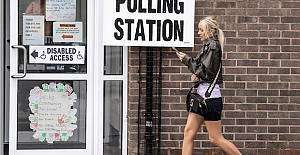 Advice for Enfield residents ahead of the General Election
Advice for Enfield residents ahead of the General Election Sunak promises tax cuts, economic stability, Conservative Party election manifesto
Sunak promises tax cuts, economic stability, Conservative Party election manifesto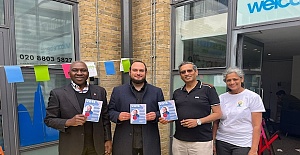 Ertan Karpazli, an independent MP candidate for the Enfield North constituency
Ertan Karpazli, an independent MP candidate for the Enfield North constituency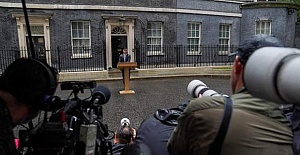 Rishi Sunak announces a general election in a statement outside Downing Street
Rishi Sunak announces a general election in a statement outside Downing Street Residents of Spanish island of Mallorca launch initiative to thank tourists amid protests over mass tourism
Residents of Spanish island of Mallorca launch initiative to thank tourists amid protests over mass tourism Srebrenica Remembered, Lessons for Justice and Peace! YEE London held a reflective event
Srebrenica Remembered, Lessons for Justice and Peace! YEE London held a reflective event British Premier Keir Starmer to reset UK-EU relations with high-profile meetings
British Premier Keir Starmer to reset UK-EU relations with high-profile meetings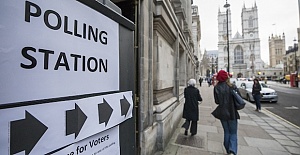 Voters head to polls for UK general election
Voters head to polls for UK general election The Swiss official will take charge of the match between Real Madrid and Atalanta in Warsaw
The Swiss official will take charge of the match between Real Madrid and Atalanta in Warsaw Applications are now open for Walking and Cycling Grants London until 9 September 2024
Applications are now open for Walking and Cycling Grants London until 9 September 2024  Two Circles also appointed as exclusive media sales agency for UEFA Women’s Champions League
Two Circles also appointed as exclusive media sales agency for UEFA Women’s Champions League  England manager Gareth Southgate has resigned two days after defeat by Spain
England manager Gareth Southgate has resigned two days after defeat by Spain Joyce and Snell's planning application gets stamp of approval
Joyce and Snell's planning application gets stamp of approval The amount of bounce back loans fully repaid is just %13
The amount of bounce back loans fully repaid is just %13 Petrol prices higher than they should be, says RAC
Petrol prices higher than they should be, says RAC UEFA and Mastercard renew UEFA Champions League partnership
UEFA and Mastercard renew UEFA Champions League partnership




